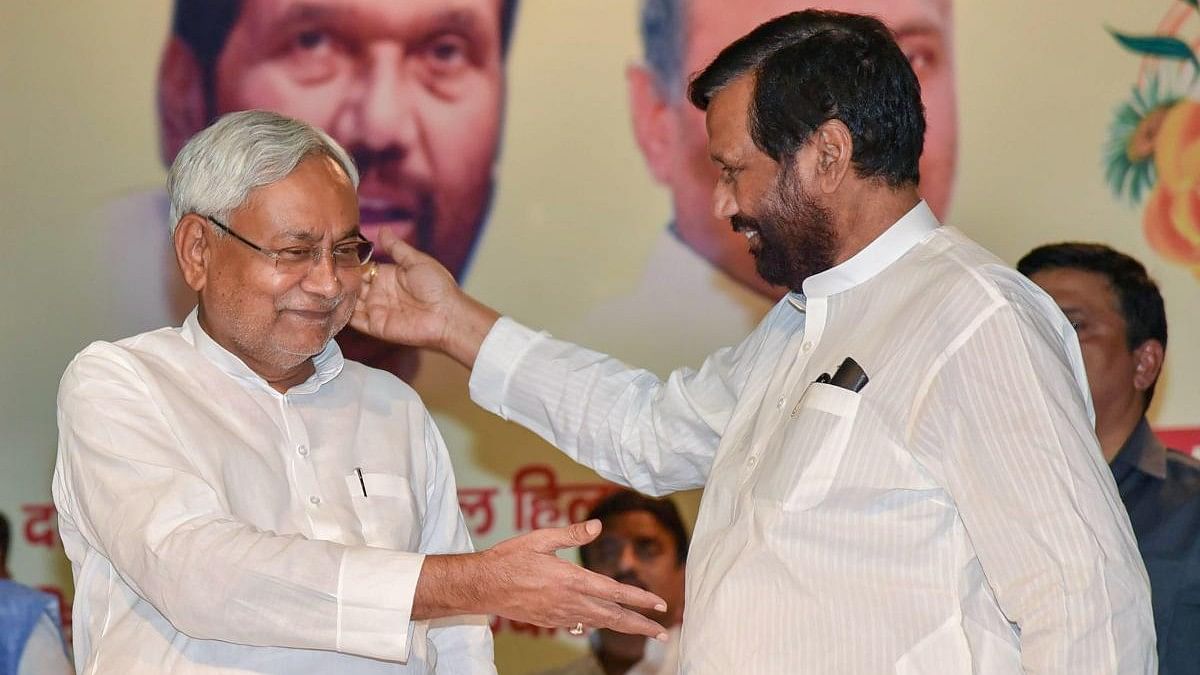
Bihar Chief Minister Nitish Kumar (left) seen here with late LJP leader Ram Vilas Paswan.
Credit: PTI Photo
New Delhi: A hand-written note by Jaiprakash Narayan calling Ramvilas Paswan "my candidate" in Hajipur, had tied the Janata Party in knots in the past, forcing it to withdraw its candidate in 1977. But 42 years later, JP protege Nitish Kumar did not appear enthusiastic when the late Dalit leader sought his support for his Rajya Sabha election, a new book says.
A new biography ‘Ram Vilas Paswan: The Weathervane of Indian Politics’ by journalist Sobhana K Nair recalls the “tense” day of June 21, 2019, the last day on which the LJP leader was to file the nominations for the Rajya Sabha elections. Nitish had his reasons to be upset with Paswan as his son Chirag was “interfering in established bureaucratic processes”.
Paswan tried every trick in the book to get Nitish on board as he spoke to him “in half sentences – touching Nitish’s knee, smiling, pleading, cajoling and coaxing,” but the Bihar Chief Minister kept him waiting for at least two hours at the Assembly before he filed the nomination paper.
“Till his death, he (Paswan) remained bitter about the treatment meted out by Nitish and often lamented in private about the mortification he was made to suffer,” the book says.
But it was in complete contrast to what happened in 1977 when he contested from Hajipur Lok Sabha, which he won eight times. Paswan was shifted from Sasaram as Jagjivan Ram had joined the opposition coalition against Indira Gandhi after the Emergency in 1977 and was being fielded from there.
In the run up to the elections, the book says, JP insisted that Paswan be sent to Lok Sabha from Hajipur but Janata Party had already handed over the symbol to Ram Sunder Das, who had filed his nomination.
“When JP heard this, he was livid. He gave Paswan a handwritten note which said, ‘I do not know who will be the Janata Party’s candidate from Hajipur. But my candidate is Ram Vilas Paswan.’ He also gave Paswan money to contest the elections. With a stamp of approval from JP, Paswan decided to contest as an independent. An embarrassed Janata Party withdrew Das’ candidature,” the book says.
The book recalls through the words of Chirag how the episode involving Nitish unfolded just before Paswan and his son were to board a flight to Patna for filing the nomination.
As his Rajya Sabha seat for Paswan was part of the NDA's seat sharing arrangement, he found it intriguing that BJP chief JP Nadda telephoned him, asking him to talk to Nitish before filing the nomination paper.
“The message was clear: Nitish Kumar was the gatekeeper and without paying obeisance to him, Paswan wouldn’t be able to get to the Rajya Sabha. Nitish was Paswan’s junior in both age and political experience. Though the two often found themselves on the same side of the political spectrum, they always had a deep disdain for each other...In the last several decades, whenever the opportunity presented itself, each tried to trip the other,” the book says.
Nitish responded to Paswan’s call from Delhi airport saying “you have already spoken to BJP, then why do you need me at all?” Straight from the airport, Paswan drove to Nitish’s official residence where the former pleaded with the JD(U) leader to accompany him to the assembly where he was headed to file the nomination.
“But Nitish remained unmoved. ‘You talk to BJP, you don’t think we matter. They will vote for you,’ Nitish told Paswan brusquely. Paswan in his usual conciliatory style kept saying, ‘Chaliye, jo ho gaya ho gaya. Chaliye rehne dijiye.’ (Come, let it be.),” the book says, quoting Chirag.
“At the Bihar assembly, the Paswans and the accompanying LJP MPs had to wait for more than two hours before Nitish turned up. The story was out. The Patna press had a field day writing about how Nitish Kumar kept the Paswans on tenterhooks.
As if the humiliation of it all was not enough, Nitish refused to hide behind the veneer of politeness. "Go and ask Paswan. Did he win the Rajya Sabha seat with just two MLAs?’" he reportedly said, according to the book.
